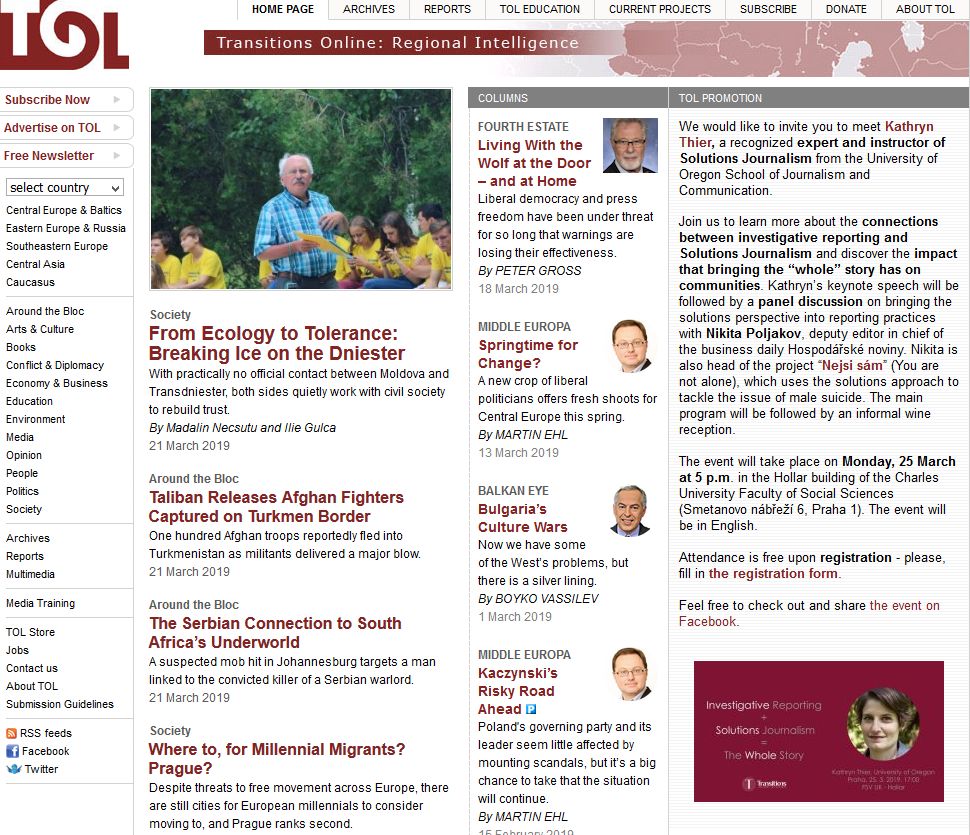
Around the Bloc: Around the Bloc - Bulgarian Officials Charged in Fake Passport Scheme
Operation reportedly sold Bulgarian ancestry certificates to people in non-EU countries.
More...We kindly inform you that, as long as the subject affiliation of our 300.000+ articles is in progress, you might get unsufficient or no results on your third level or second level search. In this case, please broaden your search criteria.

Operation reportedly sold Bulgarian ancestry certificates to people in non-EU countries.
More...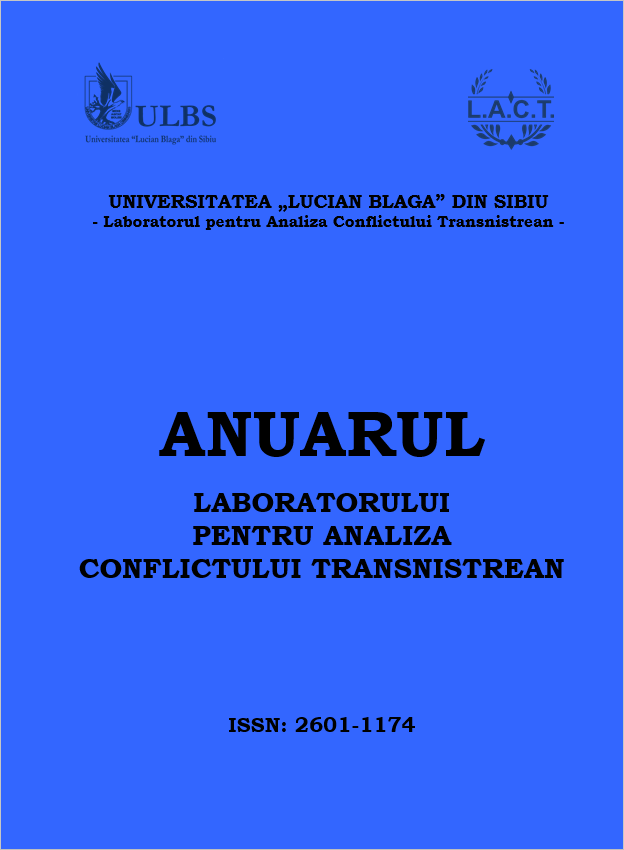
One of the stringent and actual problem of Republic of Moldova is Transnistrian conflict. The current Russian-Ucrainian crisis, which has a direct impact on regional security, creates conditions that can contribuite to the resolution of the Transnistrian conflict, including the territorial reintegration of the country. This article analizes some strategies for resolving the Transnistrian conflict.
More...
From a rational point of view, the development of the peacekeeping process is at the basis of the interests of the entire international community and the role of regional / international organizations is very important in conflict settlement.Our research aims to provide an explanatory presentation of the chronological evolution and legislative framework in which the peacekeeping format operates in the Security Zone.In order to compare and analyze the quantitative evolution of troops and military equipment as well as peacekeeping forces, we proposed to draw up a table of quantitative evolution of the Operational Group of the Russian Troops, the Armed Forces of the Republic of Moldova and the Forces Military in the Transnistrian region.
More...
The offshore company, the emblem of the tax haven jurisdictions, is owned by non-residents and it conducts activities outside the island of incorporation in order to benefit from tax advantages. The purpose of this paper is to conduct a comparative analysis on the trends of constructing the offshore corporate structures at the level of five regions where tax havens have been identified: The Caribbean Sea and Central America; Europe; Asia; The Indian Ocean and The Pacific Ocean. Based on the tax and corporate legislation the analysis is focused on the main tax advantages offered by these entities, the incorporation and administration procedures as well as the costs involved. The results have shown that pure offshore corporate legislation is to be found at the level of only three geographic areas: The Caribbean Sea and Central America; The Indian Ocean and The Pacific Ocean and the offshore law is predominantly international, with only fine regional differences.
More...
Tax havens have long been under the attention of numerous Governments and International Organizations which triggered the concern of an uneven playing field in the taxation area. As a result numerous amendments have been made to both their commercial and tax legislations in order to be in line with the internationally agreed tax standards. The aim of this article is to conduct a SWOT analysis on the offshore corporate structures found in the Caribbean landscape. Based on a selection process of the most commonly recognized tax havens in the Caribbean region and an analysis of their offshore companies at the level of incorporation, administration, activities conducted and costs, a set of frequently met characteristics have been identified which stand at the basis of the SWOT analysis. The results stand to present a comprehensive four dimension framework of the offshore corporate structures in regards to their strengths, weaknesses, opportunities and threats.
More...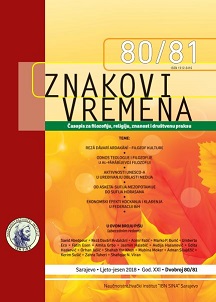
The United Nations are in the mission and function of achieving peace and freedom, especially in societies that are moving through the process of democratization and respect for the truth, freedom of expression and affirmation of human rights and freedoms. They continuously create and adopt various documents - declarations, resolutions, recommendations, etc., that oblige member states to respect and apply the regulations that make the content of these documents. This in fact ensures the development of the world community, oblige non-democratic regimes to respect the prescribed standards, and ensures the protection of peace and freedom. In this way, United Nations not only encourage states to maintain peace and cooperation and to reject conflicts within a state, but also between different countries, and also influence the development of consciousness that primarily contributes to achieving or preserving peace and democracy. In this text, in fact, exactly these activities of the United Nations in construction of the binding regulation will be discussed.
More...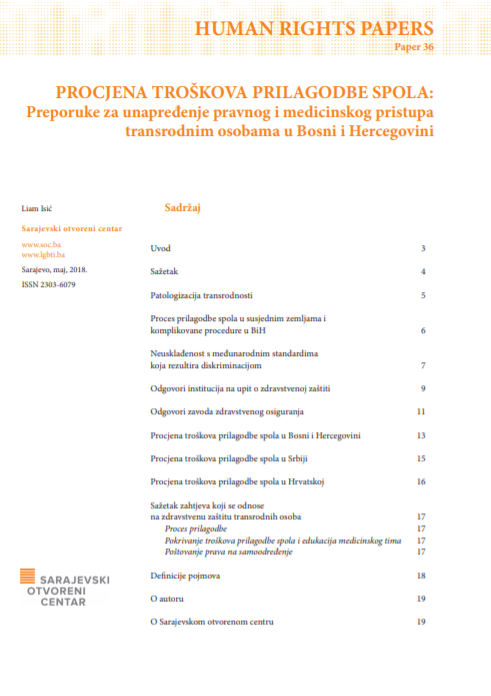
Ova publikacija ima za cilj da analizira položaj transrodnih osoba u bosanskohercegovačkom društvu, te da procjeni troškove prilagodbe spola i da preporuke za unapređenje pravnog i medicinskog pristupa transrodnim osobama u Bosni i Hercegovini. Na samom uvodu izložen je osnovni uvid u probleme i prepreke sa kojima se transrodne osobe suočavaju, a koje se odnose na nepostojanost ili neuređenost zakona, iz čega proizilazi problem neadekvatne zdravstvene zaštite. Nakon identifikovanja problema u domenu pravnog i medicinskog pristupa, iznijeti su konkretni razlozi zašto je zdravstvena zaštita transrodnim osobama potrebna, i koji su koraci u zdravstvu nužni kako bi osoba mogla započeti s procesom prilagodbe spola. U publikaciji su, također, iznesene činjenice koje se odnose na komplikovanu proceduru prilagodbe spola u BiH, te kako proces prilagodbe spola izgleda u susjednim državama (Srbiji i Hrvatskoj). Kako je po svemu navedenom jasno da se trenutačnom pravnom i medicinskom praksom diskriminiraju transrodne osobe, bilo je potrebno naglasiti da ovakva diskriminatorna praksa nije usklađena s međunarodnim standardima, pa samim tim ni Ustavom BiH, u kojem se navodi da se prava i slobode koji su predviđeni u Evropskoj konvenciji za zaštitu ljudskih prava i osnovnih sloboda i u njenim protokolima direktno primjenjuju u Bosni i Hercegovini, te da ovi akti imaju prioritet nad svim ostalim zakonima. U nastavku publikacije predstavljena su pitanja koja su dopisom dostavljena državnim i privatnim klinikama, kao i zavodima zdravstvenog osiguranja, o pružanju zdravstvene zaštite transrodnim osobama i pokrivanju troškova procesa prilagodbe spola, kao i odgovori ustanova i institucija na poslani upit. Na osnovu odgovora ustanova i intitucija potvrđen je nepovoljan položaj transrodnih osoba u bosanskohercegovačkom društvu, te je zbog toga u daljem tekstu bilo od iznimne važnosti da se procjene troškovi prilagodbe spola u BiH, Srbiji i Hrvatskoj, i da se daju preporuke za unapređenje pravnog i medicinskog pristupa transrodnim osobama u Bosni i Hercegovini.
More...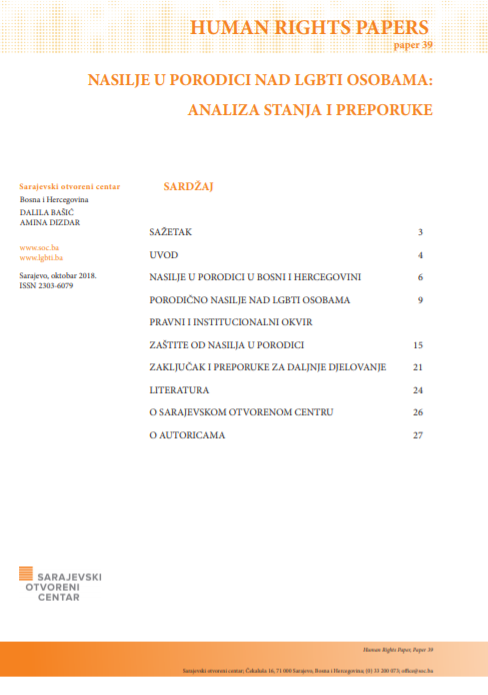
LGBTI osobe su izložene konstantnoj diskriminaciji u svim oblastima života: sloboda okupljanja, zdravlje, obrazovanje, pravo na poštivanje privatnog i porodičnog života, sport, itd. Naročit problem predstavlja nasilje, kako fizičko tako i psihičko, s kojim se suočavaju pripadnici_e ove populacije unutar svojih porodica. Cilj ove publikacije jeste analiza stanja zaštite LGBTI osoba od porodičnog nasilja. Kroz rad navodimo kojim vrstama nasilja su najčešće podvrgnute LGBTI osobe, te koji je procenat LGBTI osoba koje su doživjele nasilje unutar svojih porodica, ko su najčešći_e počinitelji_ce nasilja i kakve su posljedice za žrtve koje su pretrpjele nasilje. Izvršile smo i analize relevantnih dokumenata, a pored toga obavile smo i intervjue s predstavnicima_ ama socijalnih službi, sigurnosnih agencija, centara za mentalno zdravlje i sigurne kuće u Kantonu Sarajevo. Izvršile smo i anketno ispitivanje LGBTI zajednice, te provele dva intervjua s osobama koje su bile žrtve porodičnog nasilja zbog svog rodnog identiteta i/ili seksualne orijentacije. Osvrnule smo se i na međunarodni i domaći institucionalni okvir u oblasti zaštite od nasilja u porodici, kroz koji se uočava nedostatak adekvatnih mehanizama za zaštitu LGBTI djece od nasilja koje najčešće vrše roditelji ili braća i sestre. Na kraju publikacije navodimo nekoliko preporuka koje je neophodno implementirati kako bi se poboljšao stepen zaštite LGBTI žrtava od porodičnog nasilja i suzbila diskriminacija zbog seksualne orijentacije i/ili rodnog identiteta.
More...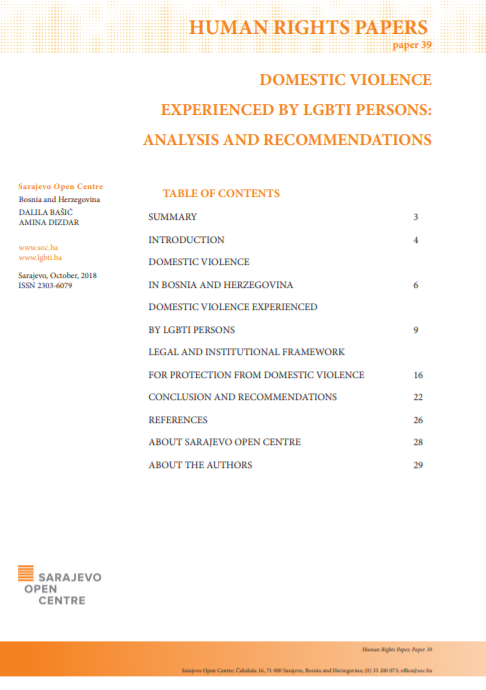
(English edition) LGBTI persons are exposed to continuous discrimination in all spheres of life: freedom of assembly, health, education, right to respect of private and family life, in sports etc. A specific problem this population faces inside their families is violence, both physical and psychological. The purpose of this publication is to provide an analysis of the state of protection of LGBTI persons from domestic violence. The paper presents the types of violence LGBTI persons are most often subjected to, as well as the percentages of LGBTI persons who have experienced violence in their families, the most common perpetrators of violence and the consequences for the victims of violence. We also analysed the relevant documents, and conducted interviews with representatives of social services, security agencies, mental health centres and safe houses in Sarajevo Canton. We surveyed the LGBTI community and carried out two interviews with persons who experience domestic violence because of their gender identity and/or sexual orientation. We took into account the international and domestic institutional framework relevant to protection from domestic violence which indicates a lack of adequate mechanisms to protect LGBTI children from violence committed most often by parents or siblings. In the last part, we present a number of recommendations to be implemented in order to improve the level of protection of LGBTI domestic violence victims and combat discrimination on the grounds of sexual orientation and/or gender identity.
More...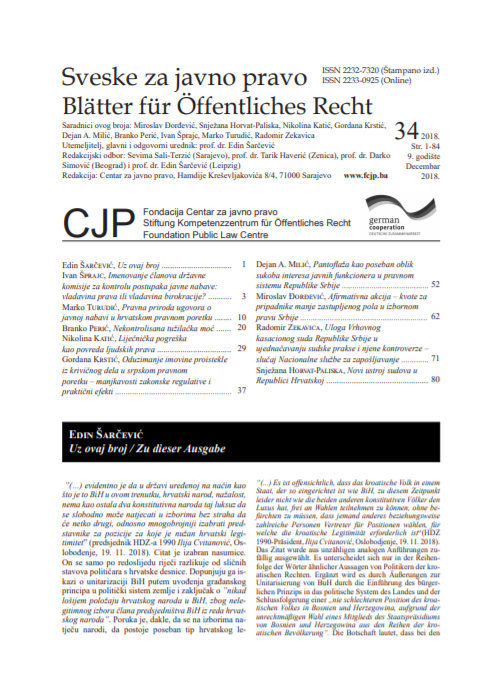
The paper examines the regulation of appointment of the members of the State Commission for Supervision of Public Procurement Procedure according to the Act on the State Commission for Supervision of Public Procurement Procedure. The author criticises existing legal norms from the perspective of relevant constitutional and international agreements' norms. The lack of appropriate procedures indicates the potential violations of rights of the interested citizens as well as it points to excessive discretion of the authorities. Finally, it is recommended to enact the necessary procedures.
More...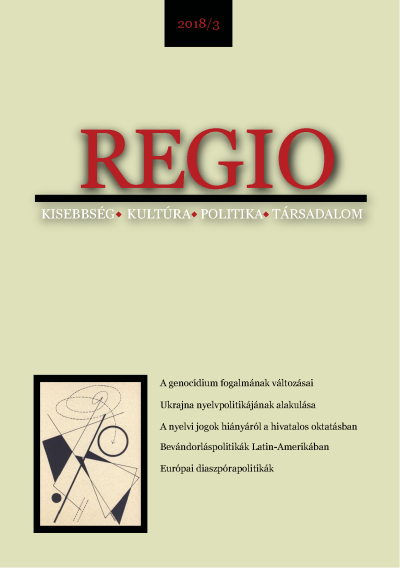
This study deals with the changes in the meaning of genocide during the past seven decades. It discusses the circumstances of the origin of the legal concept in the works of Raphaël Lemkin and in the international legal documents of the United Nations, and analyzes the political and social concepts of genocide explicated in the years of 1970 and 1980. From the fact that the legal provision of the 1948 Genocide Convention has not been applied in judicial decisions for decades, some experts have come to the conclusion that it should be renewed. During the past three decades, several alternative concepts were coined (such as „democide”, „politicide”, „holodomor”, etc.). These conceptual experiments, however, were not successful.
More...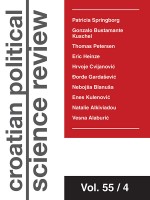
This paper looks at the tools available on an international and European level in relation to the legal regulation of hate speech. More particularly, it considers the International Covenant on Civil and Political Rights and the International Convention on the Elimination of All Forms of Racial Discrimination along with related case-law of the respective monitoring committees. It looks at the European Convention on Human Rights and how the European Court of Human Rights interprets the limits of free speech when confronted with cases of hate speech. It also looks at the Framework Decision on Racism and Xenophobia of the European Union and the Additional Protocol to the Cybercrime Convention of the Council of Europe. Through the analysis it demonstrates that there is no common approach amongst international and European institutions on what hate speech is and the threshold which needs to be met for legal regulation to be permissible. It also demonstrates that the tools available focus only on some types of hate speech.
More...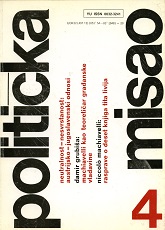
There are three current fields of Yugoslav-Austrian relations settled by international law: the status of national minorities, environmental protection and the exploitation and protection of the sea. A new dimension of the status of national minorities as reflected in international law is provided in the International Treaty on civil and political rights. In addition to the provisions guaranteeing the national minorities the rights to their own religious practice, the use of their language and their- national culture, the Treaty also establishes various forms of inspection over the realisation of these rights. Among the current environmental problems settled by international law, of especial importance is the consent of Austria to the conclusion of an international agreement on the protection of the waters of the Danube, which has not existed hitherto. As for the legal regulation of the exploitation and protection of the sea, a significant event is the ratification of the 1982 Convention on the Caw of the Seas, which elaborates the rights of Landlocked states in the exploitation of the sea and the sea-bed. Landlocked states are equal with coastal countries in the exploitation of the open seas, as well as within the international regime of the exploration and exploitation of the sea-bed outside national jurisdiction. In order to assert these rights, landlocked states are entitled to access to the sea and to free transit over the territory of transit states. However, they must bear part of the costs and burden of the protection and preservation of the sea and of its natural resources. All of this provides a good basis for a long-term co-operation between Yugoslavia and Austria also in these fields.
More...
On December 10th, 2014 the Constitutional Court of Serbia rendered a decision declaring itself incompetent to review so-called „Brussels Agreement“, governing the normalization of relations between the Government of the Republic of Serbia and Interim Institutions of Local Self-Government in Priština. The Constitutional Court based its decision on procedural grounds, finding that neither Brussels Agreement nor internal acts adopted by the Serbian Government and National Assembly with regard to that Agreement, could be subjected to judicial review in accordance with Article 167 of the Serbian Constitution. The author of this article agrees with the Court decision, but not with its reasoning leading to a denial of jurisdiction. The article offers alternative road to a declaration of incompetence, which the Court could have reached following the separation of powers principle and the political question doctrine. Starting from the comparative constitutional jurisprudence, the contents and aims of the Brussels Agreement, as well as political context in which it was reached, the author of this article has shown the following: (a) the Brussels Agreement was not reached in order to allow the refunctioning of the state power on the territory of Kosovo and Metohija, but to protect the Serbian people living at KiM and general state interests to the extent possible in the given political situation, until the re-establishment of full sovereignty; (b) the Constitutional Court could not establish its jurisdiction ratione materiae and decide whether the protective mechanisms, envisaged in the Agreement, that is – the establishment of a Community/ Association of municipalities in which Serbs represented a majority of the population, as well as organization of judicial power and police units, could have protected Serbs and general state interests in Kosovo and Metohija, because this was a political question which was unjusticiable and could not be resolved by legal standards.
More...
Prvi sporazum o principima normalizacije odnosa Beograda i Prištine tj Republike Srbije i samoproglašene „Republike Kosovo“, poznat i kao Briselski sporazum je potpisan 19. aprila 2013. u Briselu. Sporazum su ispred Republike Srbije potpisali predsednik vlade Ivica Dačić i predsednik vlade samoproglašene „Republike Kosovo“ Hašim Tači. [...]
More...
The author attempts to bring trials for international criminal offences closer to historians. The focus of his analysis is on constructivist aspect of court’s proceedings- how one reaches judicial „truth“ rather than whether such a truth objectively corresponds to reality, or what has so far been established as court’s truth about conflicts and crimes in former Yugoslavia. The author carries out this bringing of international and criminal law closer to historic science through explanations of the work, proceedings and judgements of International criminal tribunal for former Yugoslavia. He also analyses proceedings in courts of former Yugoslav republics. Author maintains that, in spite of common view that proceedings for international criminal offences in national courts are ethnically biased and abused, such proceedings contribute to establishment of documentation and fact finding on crimes in the region. He furthermore claims that abovementioned proceedings remain unprecedented in world history because they deal with a country’s own citizens and events that took place in it’s own territory on a massive and continuous basis. The basic premise of author’s work is the idea that courts should not deal with history or write it, since that is historians’ task. Even though some judgements of the Hague Tribunal mention the necessity of creating accurate historic records in the course of proceedings, such aspirations are far from overwhelming understanding of purpose of a trial for war and other most serious crimes. Resolutions of United Nations’ Security Council that set up tribunals for former Yugoslavia and Rwanda don’t mention determining the truth about conflicts as part of tribunals’ mandates.
More...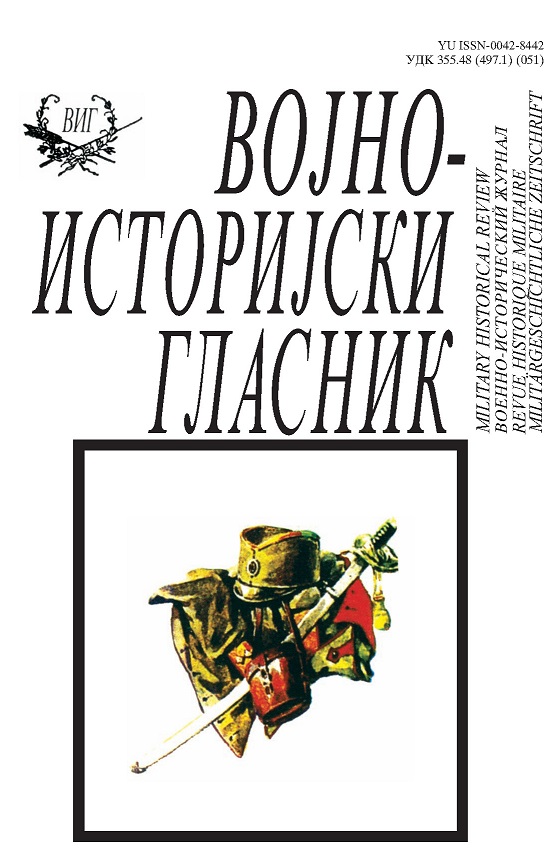
In the international law the restitution means the obligation of former enemy state to return the property which was taken by force which was taken from the territory which that state held under occupation. Czechoslovakia, certainly, was not the enemy state, but a part of the Yugoslav property taken by the Germnans during the war finished in the territory of Czecholsovakia, and therefore, in the relations between Yugoslavia and Czechoslovakia emerged the issue of the restitution of the property. The reason why a part of the teken property finished in Czechoslovakia laid in the fact that the Yugoslav and Czechoslovakian industry cooperated before the war, that Czechoslovakian factories like “Zbrojovka” and “Skoda” delivered machines to the Yugoslav military industry, so that they were relevant to do the dismantling of these machines during the war within the intentions of the Germans to take away the machines from Yugoslavia. Besides, at the territory of Germany after the war, there was a number of machines made in Czechoslovakia which were either taken away from Yugoslavia or produced before the war but on order and probably paid in advance for the Yugoslav factories. In the first case the machines after the war were restituted into Czechoslovakia according to the principle of producer’s origin, and in the second case the Czechoslovakians restituted them stating that they had ownership of them, and these were the reasons for the disputes after the war, since Yugoslavia in both cases claimed the right of ownership over these machines. Due to the fact that before the war MTI Kragujevac cooperated first of all with “Zbrojovka” from Brno, аnd MTI Vogošća with “Skoda” from Plzen, the restitution requests for return of the property of these two institutions were mainly directed to these Czechoslovakian factories. However, all or almost all the Yugoslav requests for return of the property were negatively solved. The Yugoslav authorities did not have enough people to work more eagerly and more systematically on that issue, first of all on the very grounds in Czechoslovakia, so that these issues were solved only by pure correspondence with the Czechoslovakian authorities who answered on all the Yugoslav requests and urges that the demanded goods, first of all machines, were not at the territory of Czechoslovakia, and that the data given by the Yugoslav representatives were incomplete and that the archives of the Czechoslovakian factories were destroyed in war so that it was impossible to check the authenticity of the Yugoslav statements.
More...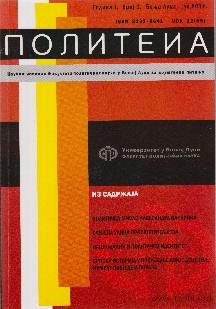
The autor in this work starts with a thesis that a Serb people during last two decades of their history, or at the pass from the 20th to 21st century, experienced several historical debacles, firstly on the political field, what is most obvious in the fact that during that period, Serbs had lost several states that they were building, treated like and loved as their owns, in a series of civil wars caused not with their intention: SFR of Yugoslavia, FR of Yugoslavia, Serbia and Montenegro, Republic of Srpska Krajina, left many teritories trying to save their own lives and their biological existence, and there where they remained, instead of a constitutive people they became national minorities which gravely fight for their basic human rights. A Serbian defeat is also a fact that by numerous foreign autor(itie)s Serbs were collectively recognized as a criminal, genocide and tribalistic people, unworthy of history, that, for the purpose of their cultivation, must be collectively punished, reeducated, what is best instrumented with the Tribunal in Haag (ICTY) with its policy of indictments, trials and condemnations of Serb well-knowns from all Serbian lands, what had a negative influence on that's people moral and selfrespect today. The only bright spot in the dark of Serbian defeats and negative balance in their history is Republic of Srpska, which was made by will, contumacy and selfsacrifice of Serbian people in BiH. Both, victory and defeat requires multidisciplinary and multiperspective approach and valorization.
More...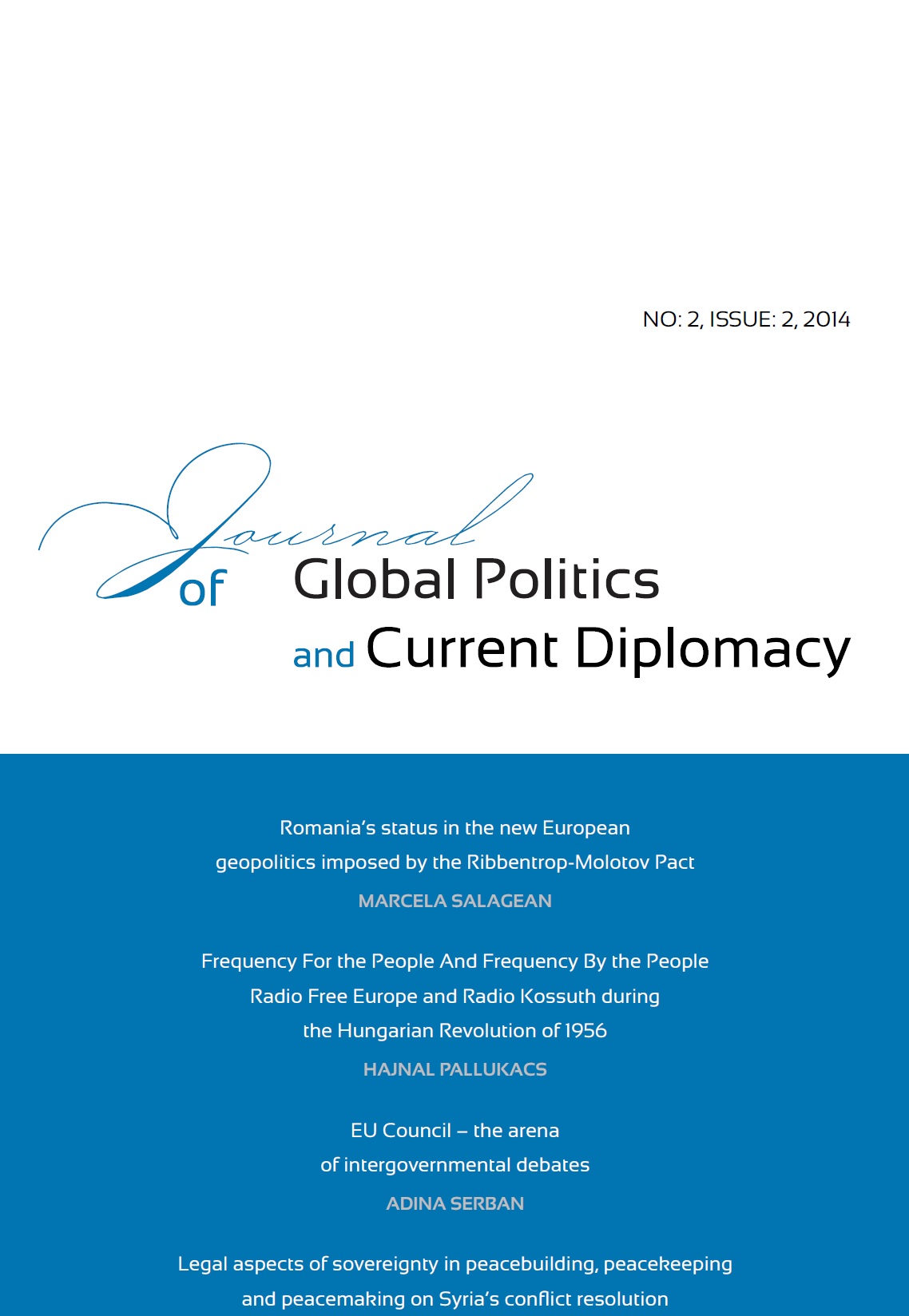
With the events of the terrorist attacks of 9/11, the international relations scene has changed, and the principles already known needed a new approach both restrictive and progressive. The challenges are reflected in the relationships between states and peace-building, peacekeeping and peace-making, as any other concepts, have undergone some changes, having to do with challenges, which may diminish the importance or validity of the sovereign right.
More...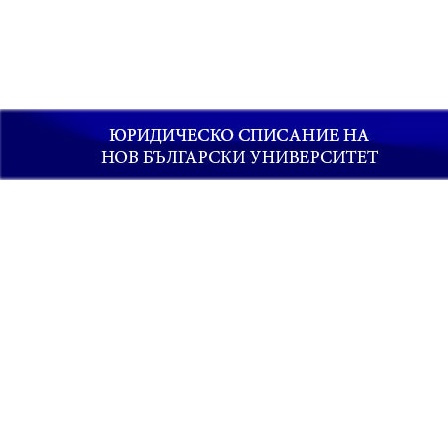
Nowadays there are numerous jurisdictions acting in the international legal field even though they are a comparatively recent achievement of international law. Due to their increasing number and role it becomes more and more difficult to discern their proper field of competence and their specialization. That often provokes patent mistakes especially in mass media. The present study aims at a concise and comparative presentation of the basic characteristics of the leading international jurisdictions both in the universal UN system and on regional level.
More...